Online certificate programs in wildlife and forestry conservation allow students to turn their passion for animals and nature into career potential.
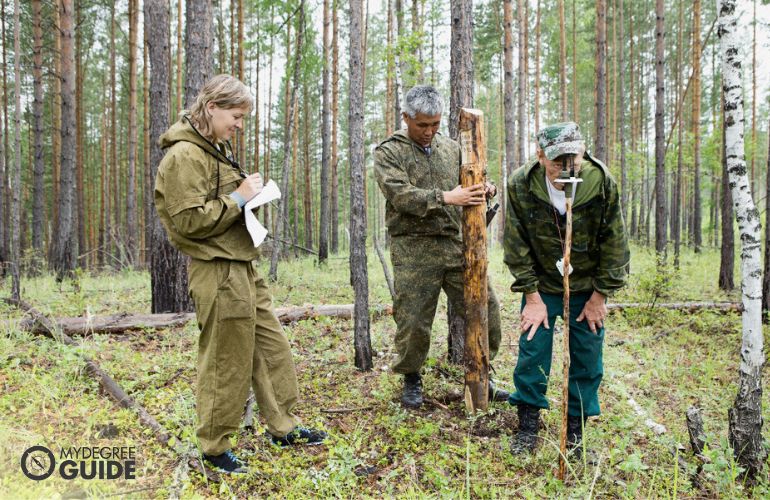
Experts in this field maintain and restore healthy natural ecosystems and wildlife populations. They also work to reduce the impact of harmful human actions on the environment, such as deforestation, forest fires, poaching, and pollution.
Editorial Listing ShortCode:
Compared with an online environmental science degree, you can typically complete an online wildlife and forestry conservation certificate program faster. So, this academic credential can be a strategic choice if you want to quickly start or advance a career working with nature.
Universities Offering Online Forestry and Wildlife Conservation Certificate Programs
Methodology: The following school list is in alphabetical order. To be included, a college or university must be regionally accredited and offer programs online or in a hybrid format.
Auburn University
Auburn University offers graduate certificates in Restoration Ecology, Forest Finance and Investment, and One Health. All these programs are online for the convenience of working professionals. Course credits earned may be applied to graduate degrees from Auburn.
Auburn University is accredited by the Southern Association of Colleges and Schools.
Colorado State University
Colorado State University offers an online program for a Graduate Certificate in Conservation Actions with Lands, Animals, and People. The program requires the completion of 12 credits and can typically be finished in 2 semesters. Potential courses include Leadership and Public Communications, Natural Resources Policy and Biodiversity, and Action for Sustainable Behavior.
Colorado State University is accredited by the Higher Learning Commission.
Oregon State University
Oregon State University’s Graduate Certificate in Urban Forestry requires the completion of 18 to 20 credits. The certificate can be earned online, and there are start dates offered in the spring, summer, and fall. Completing this certificate program may satisfy the emphasis requirement for Oregon State’s Master of Natural Resources.
Oregon State University is accredited by the Northwest Commission on Colleges and Universities.
University of Illinois – Urbana Champaign
The University of Illinois—Urbana Champaign offers a Wildlife and Fisheries Conservation Certificate. The program uses a hybrid in-person and online format and offers start dates in fall and spring semesters. The curriculum typically consists of one required course—Wildlife Conservation in the 21st Century—and two electives.
The University of Illinois – Urbana Champaign is accredited by the Higher Learning Commission.
University of Massachusetts – Amherst
The University of Massachusetts—Amherst offers a 15 credit Arboriculture and Urban Forestry Certificate. The program allows new students to start in the fall, spring, or summer and is flexible to help accommodate work schedules. Courses may be completed in any order at a student’s own pace.
The University of Massachusetts Amherst is accredited by the New England Commission of Higher Education.
Online Certificate Programs in Wildlife and Forestry Conservation

Wildlife and forestry conservation focuses on protecting, preserving, and studying the natural world. Specialists in this discipline may manage ecosystems, forests, animals, and natural resources.
They also ensure that humans enjoy natural spaces like parks without damaging the environment. Their duties may include clearing new trails, educating tourists about invasive species, and planting trees to restore a forest. Additionally, wildlife and forestry conservationists work to identify and reduce the effects of environmental issues.
Many serious problems affect natural ecosystems, including climate change, habitat destruction, and biodiversity loss. Conservationists develop innovative solutions to these issues. For example, experts have helped endangered species like the gray wolf repopulate and have built wildlife bridges under highways to let animals migrate safely.
A wildlife and forestry conservation certificate can help you develop relevant knowledge and skills. Here are a few topics commonly covered in these programs:
- Aquaculture
- Biology
- Bird studies
- Botany
- Ecology
- Environmental education
- Environmental ethics, laws, and policies
- Forest management
- Global conservation issues
- Hydrology
- Impact of ecotourism
- Mammalogy
- Wildlife habitat management
As you complete your coursework, you can also gain soft skills like communication, critical analysis, and teamwork. These abilities can be beneficial for careers in wildlife conservation and similar roles. For example, you might write grants to fund conservation programs and teach legislators about wildlife management.
Some online wildlife and forestry conservation programs include experiential learning opportunities. You might be required to complete an internship or participate in fieldwork. These hands-on experiences allow you to apply your skills in a real-world setting and explore potential careers.
Graduates who earn a wildlife and forestry conservation certificate pursue a broad range of career paths, such as:
- Forest and conservation worker
- Forestry technician
- Natural resource technician
- Animal care specialist
- Firefighter
In addition, some graduates use their wildlife and forestry conservation certificate as a stepping stone to an associate’s or bachelor’s degree, such as an associates degree in environmental science online or on campus. These degrees may help you qualify for more career paths, like wildlife biologist, conservation scientist, forester, ecologist, and zoologist.
Wildlife and Forestry Conservation Careers & Salaries
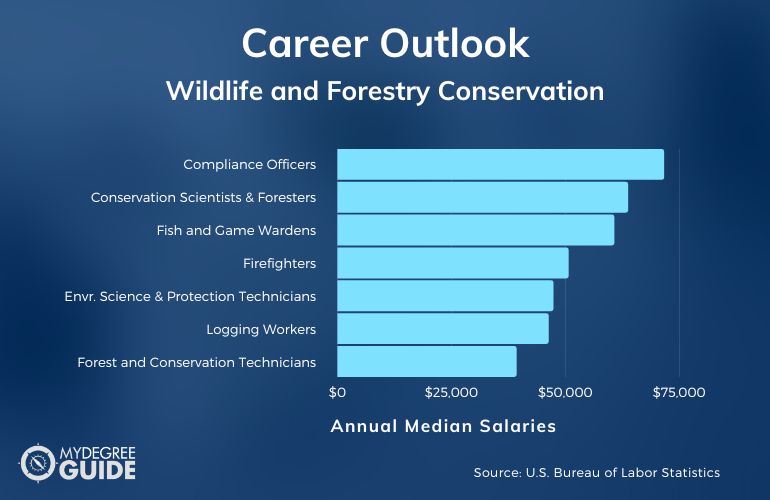
Graduates who complete a forestry and wildlife management certificate online secure roles in a number of industries. Many students pursue jobs that allow them to work directly with nature in forests, national parks, zoos, and similar settings.
Additionally, some companies hire forestry and wildlife conservation experts to minimize their environmental impact. For example, these professionals might help a construction company ensure their building projects won’t disturb local wildlife populations.
You might also consider working for an environmental consulting firm. Consultants help clients comply with environmental regulations, develop more sustainable practices, and protect natural habitats.
Based on Bureau of Labor Statistics data, here are the annual median salaries of careers associated with wildlife and forestry conservation.
| Careers | Annual Median Salaries |
| Compliance Officers | $71,650 |
| Conservation Scientists and Foresters | $63,750 |
| Fish and Game Wardens | $60,730 |
| Firefighters | $50,700 |
| Environmental Science and Protection Technicians | $47,370 |
| Logging Workers | $46,330 |
| Forest and Conservation Technicians | $39,290 |
| Forest and Conservation Workers | $30,550 |
| Recreation Workers | $29,680 |
| Animal Care and Service Workers | $28,730 |
Some of these positions, such as foresters and conservation scientists, require additional education and training.
Job openings and salaries can also vary based on your employer, geographic location, and work experience. You may increase your chances of securing a preferred position by completing additional certifications or degrees, gaining volunteer experience, and networking in your field.
Employers for forestry and wildlife conservation professionals include aquariums and zoos, fisheries, government agencies, logging or timber companies, national and state parks, and wildlife rehabilitation centers. Positions within community development, ecotourism, and nonprofit organizations may also be available.
Wildlife and Forestry Certificate Curriculum & Courses

All wildlife and forestry conservation certificate programs offer a unique combination of courses. You may have the opportunity to take classes similar to these:
- Action for Sustainable Behavior: You’ll develop practical skills by helping a local organization implement sustainable practices or develop eco-friendly community programs.
- Bird Wildlife Management: This course investigates avian biology, bird reproduction, and strategies to monitor and rebuild bird populations.
- Ethics for Wildlife and Land: You can analyze significant theories in American conservation ethics related to land and wildlife management.
- Habitat Management: You’ll learn about various habitats, methods to maintain healthy wildlife populations, and strategies to combat habitat destruction.
- Issues in Conservation: This course examines international conservation issues and safety policies for conservation and forest workers.
- Large Mammal Management: You’ll learn about the biology of large mammals, ways to manage their populations, and legal issues that affect them.
- Leadership and Public Communications: This class teaches effective communication methods that you can use to educate the public about the environment and encourage positive behaviors.
- National Resources Policy and Biodiversity: You’ll study court decisions, historical laws, and contemporary issues related to biodiversity, habitat conservation, and natural resources management.
- Wildlife Conservation Policy – Current Events: This class explores past, present, and future consequences of environmental conservation policies in the United States.
- Wildlife Habitat Management on Private Land: This course covers management strategies that ensure that private lands have enough food, water, and other resources to sustain wildlife.
Some certificate programs allow you to choose elective classes that can prepare you for a preferred career path, like an environmental educator or a wildland firefighter.
Admissions Requirements

All wildlife and forestry conservation certificate programs have individual admissions processes, but you may be required to submit these common materials:
- Online application and fee
- High school transcripts
- Letters of recommendation from your teachers or employer
- ACT or SAT scores (only some schools require them)
You can usually find the specific admissions requirements for each program on their school’s website. It’s helpful to research each school’s admissions criteria ahead of time so that you can assemble all the necessary documents, like reference letters and transcripts.
Accreditation
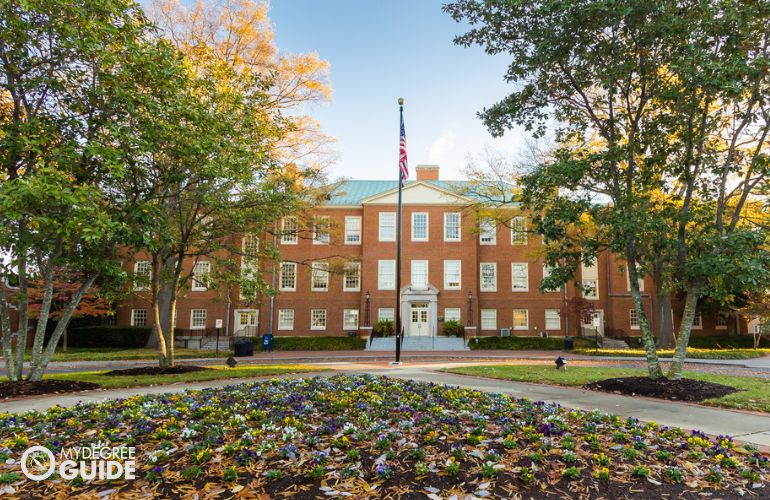
You may want to prioritize regionally accredited schools as you research online forestry and wildlife certificates. Postsecondary schools can earn regional accreditation if they demonstrate that their programs and student services meet strict quality standards set by an external regional accrediting organization.
Enrolling in a regionally accredited school helps ensure you’ll receive a quality education. As a result, many employers prefer to hire graduates from accredited schools. Plus, some professional organizations only accept new members if they’ve attended an accredited program.
You can visit the US Department of Education’s website to learn more about regional accreditation.
Financial Aid and Scholarships

Certificate programs typically cost less than degree programs. Still, you may want to research financial aid options to help reduce the upfront cost of your tuition, textbooks, and other fees.
You might consider starting your research by completing the Free Application for Federal Student Aid (FAFSA). This form determines your eligibility for federal aid. The federal government provides three main types of assistance to qualifying students:
- Grants: Students usually don’t need to repay this merit- or need-based financial aid.
- Work-study jobs: You can earn money for school by working part-time for your college or an off-campus employer. Typically, off-campus jobs are related to your field of study or benefit the public interest.
- Student loans: You can borrow money from the government to pay for your schooling and repay it later with interest.
Additionally, your college may offer grants and scholarships to eligible applicants. Some employers also have tuition reimbursement programs.
What Is a Forestry and Wildlife Conservation Certificate?
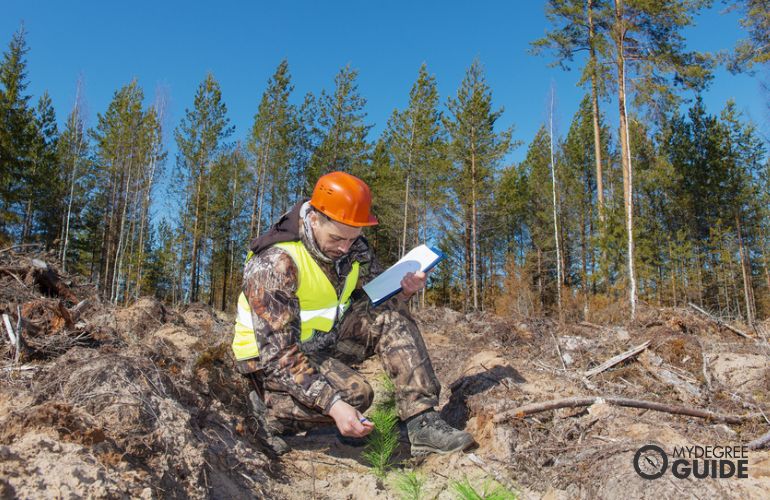
A forestry and wildlife conservation certificate is an introduction to biodiversity, habitat management, and wildlife conservation.
Most undergraduate certificate programs are short and focus on fundamental knowledge and skills related to environmental preservation. During your studies, you can gain a deeper understanding of the scientific principles that shape ecosystems and natural habitats. You can also learn about the complex relationships between humans and the environment.
Many of your courses will likely discuss critical environmental issues like air pollution, climate change, endangered species, and wildfires. You can also learn strategies to raise public awareness of these issues and help protect the environment.
What Can You Do with a Certificate in Wildlife & Forestry Conservation?
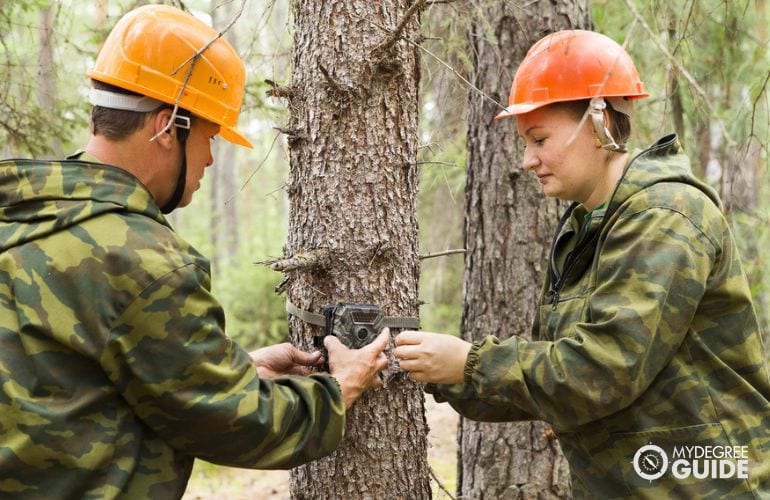
Earning a forestry and wildlife certificate online can help prepare you for various careers related to the environment. Many graduates want to immerse themselves in the outdoors and help manage and preserve habitats. They often find employment as forest workers and conservation workers.
Other forestry and wildlife specialists ensure that companies follow environmental laws and policies. They might work for government agencies as environmental compliance inspectors. They could also work directly with corporations as an ecological consultant.
Graduates can also spread environmental awareness by working as public outreach coordinators. A certificate in wildlife and forestry conservation may also count toward a related degree program.
How Long Does It Take to Get a Certificate in Wildlife and Forestry Conservation Online?

The time it takes to earn an online forestry and wildlife management certificate depends on several factors, including your enrollment status and the number of required courses.
You can complete most online wildlife and forestry conservation certificate programs in less than 1 year. These programs typically involve 4 to 8 courses or approximately 12 credit hours. Full-time students can often complete these classes in two 16-week semesters.
Some programs offer accelerated options that may take as little as 5 months to complete. It will likely take longer to complete your certificate program if you enroll part-time.
Is a Certificate in Forestry and Wildlife Conservation Worth It?
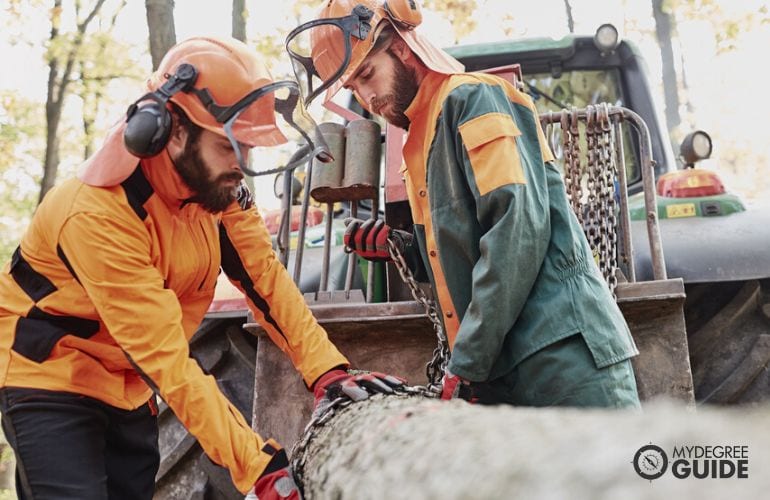
Yes, a certificate in forestry and wildlife conservation is worth it for many students. This academic program lets you expand your knowledge of ecosystems and the creatures that inhabit them.
Earning a forestry and wildlife certification online can open the door to a number of entry-level careers. Most professionals with an undergraduate certificate pursue roles as forest and conservation workers. Many conservation-related jobs are expected to see steady growth.
For instance, employment for conservation scientists and foresters is projected to increase by 5% over the next ten years (Bureau of Labor Statistics). While these positions typically require bachelors, a certificate program may act as a stepping stone toward a related degree program.
Getting Your Forestry and Wildlife Conservation Certificate Online

You can turn your love of nature into a career by completing an online forestry and wildlife conservation certificate program. These programs cover many fascinating subjects, like bird reproduction, habitat restoration, and ecotourism.
As a forestry and wildlife conservation specialist, you could play a vital role in fighting and raising awareness of climate change and other environmental issues. For example, you could clear trails in national parks or help preserve endangered trees as a forest worker.
You can jumpstart your educational journey today by exploring forestry and wildlife conservation certificate programs from accredited schools.
